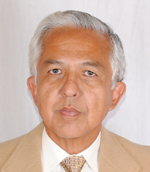
Roberto Accinelli, MD
From his earliest schooling at a Peruvian Jesuit school, Roberto Accinelli, MD, a medical professor at Universidad Peruana Cayetano Heredia (UPCH), has been driven to help less fortunate Peruvians.
“As boys at school, my brothers and I were reminded every day that we were privileged, and that it was our duty to devote our future acts to serving the poor,” Dr. Accinelli recalls. “From being taught to serve others to dreaming about changing the country was only a small step.”
Soon after receiving his medical degree, Dr. Accinelli embarked on a lifetime journey of improving the health of Peruvians, working with Cesar Villaran, MD, to establish the asthma clinic at the Hospital Nacional Cayetano Heredia (HNCH) in Lima before traveling to the high-altitude city of Tarma to complete a year of medical social service. While there, he met Felix Mayorca, MD, who was spearheading the region’s tuberculosis treatment program.
“While working in Tarma, I fulfilled the concepts of Raul Leon-Barua, MD, a Peruvian gastroenterologist, who said, ‘For research we just need the eyes, hands, a paper, and a pencil,’ ” Dr. Accinelli says. “Our resources were limited, but we did what we could with what we had.”
Following his residency, Dr. Accinelli was selected to head the tuberculosis program at UPCH. Since that time, he has devoted much of his life to improving access to treatment.
“At the beginning of the ’80s, the Peruvian TB situation was very bad,” Dr. Accinelli says. “There were only enough drugs to treat four of every ten patients with the disease, and there were not sufficient resources for smear studies, chest x-rays, or sputum cultures. In some Lima TB programs, more than half of patients dropped out.
“I knew that in Peru, we had a Brazilian donation of one million tablets of isoniazid plus thiocetazone (Diateben) that nobody was using, so I asked the national director of the TB program to allow us to use that supply to administer an initial treatment that was different from what was given in the national TB program, and he accepted my proposal,” Dr. Accinelli says. “As a result, we became the only area of the country with treatment for all TB patients.”
During the decades he has practiced medicine, Dr. Accinelli has been involved in dozens of research projects. In 2005, he received the national Pacifico de Oro Award for research demonstrating the need for more modern cooking stoves.
“This research demonstrated, for the first time, that switching from a traditional three-stone cooking stove to a stove with an improved design would reduce inflammation and other respiratory complaints significantly,” Dr. Accinelli says. “Media coverage of the award resulted, ultimately, in the establishment of a national campaign aimed at replacing traditional stoves with improved models and educating Peruvians in the dangerous biological side effects that are associated with the use of unimproved stoves. Nearly a quarter million traditional stoves have been replaced by improved models.”
Dr. Accinelli notes that from 2002 to 2010, the Peruvian gross domestic product more than doubled, yet the indifference toward the poor has continued.
“In my university hospital during those years, we did not have a spirometer or a bronchoscope,” he says. “Now, we are finishing a new building for the study and treatment of lung diseases, and we are trying to obtain all the instruments we need, including the ones needed for molecular biology and genetics.
“I dream that, eventually, we will be able to train our residents under the same conditions that exist in the United States.”
Dr. Accinelli and his team are developing an innovative national program to teach primary care trainees about lung diseases. Students will learn and correspond via the Internet for six months and then spend three months on-site in Lima. “We need more pulmonologists, but it is impossible to train them in the quantities that we need using only traditional methods,” he says.
In 2011, Dr. Accinelli received the ATS World Lung Health Award for his contributions to pulmonary medicine.
“Belonging to the ATS has taught me what can be achieved when we recognize excellence, and that humility is the hallmark of wisdom,” Dr. Accinelli says. “Every year, I look forward to reconnecting at the ATS conference with colleagues from around the world, sharing knowledge as well as an understanding of our work, lives, and professional motivations.
“After the conference, when I return to Lima, I can only try to find better ways to serve my patients and students, using what I have learned from my friends.”

